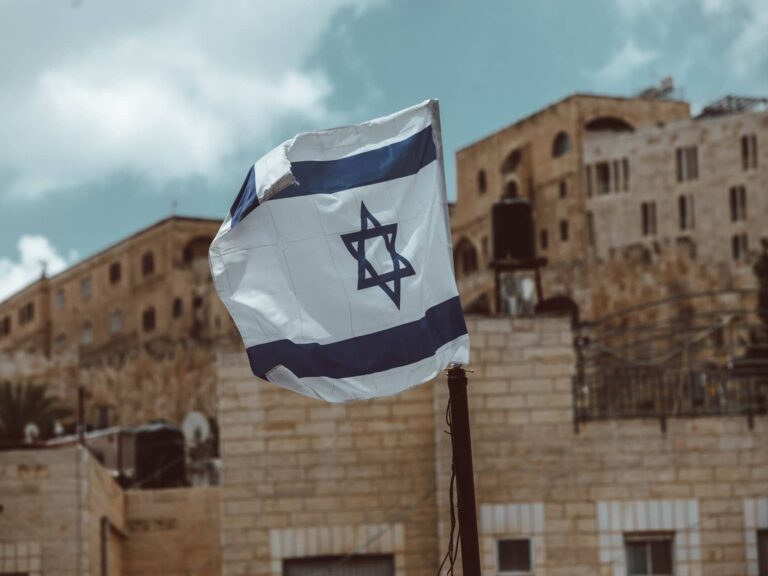An Anatomy of Turkish Foreign Policy: 1995 – 2020, Issue #3: Turkey & Israel
Introduction
This study is second first bilateral analysis of Turkish Foreign Policy (TFP) in the research project titled: “An Anatomy of Turkish Foreign Policy.” Our first bilateral analysis was Turkey and Russia. Our goal is to quantify TFP’s evolution between 1995 and 2020 through a data-driven account free of speculative remarks. In this analysis, we will focus on the evolution of Turkey’s bilateral relations with Israel. In doing so, we will begin with a quantitative analysis of the relations to provide an overview. Next, we will survey the notable events between the two countries that impacted the bilateral relations.
The Data
We use data from the publicly available Lockheed Martin Advanced Technology Lab’s Integrated Crisis Early Warning System (ICEWS) event database in the present analysis. We discuss the methodology in Issue #1 of this series.[1] In brief, ICEWS features information on directed dyadic interactions between countries (i.e., Turkey and Israel), where each observation includes details of who (source) did what (action) to whom (target), when (time), and where (location). Each interaction is then assigned an intensity score that ranges between -10 and +10 based on the category of the interaction. Negative interaction intensity scores imply conflict, and positive interaction intensity scores imply cooperation. We calculate monthly and annual averages of the intensity scores to form indices.
Turkey – Israel Relations: An Overview
How frequently does Turkey interact with Israel, and what is the nature of its interactions? In Issue #1, we demonstrate that Israel is one of the top interaction partners of Turkey. The aggregate interaction frequency suggests that the total is the sixth-highest in the period between January 1st, 1995, and April 30th, 2020. ICEWS features 6,964 observations with Israel within this timeframe, of which 1,975 are unique interactions.[2] This number corresponds to almost four percent of Turkey’s total interactions of 186,255. Table 3.1 below compares the summary statistics of Turkey’s directed dyadic interaction intensity scores with Israel and the rest of the World.

The summary statistics in Table 3.1 provides a good overview of the overall interactions’ essence. The lower average intensity score of 0.61 between Turkey and Israel compared to the 1.34 between Turkey, and the World suggests that Turkey’s relations with Israel vis-à-vis the World were, on average, less cooperative. This difference can also be qualitatively captured by exploring the shapes of the distributions. Figure 3.1 and Figure 3.2 below are event intensity score distributions. In both distributions, any value to the left of 0 suggests a conflictual interaction and to the right suggests a cooperative interaction. We also include the results of a simple difference-in-means test in Table 3.2, which suggests that there was a statistically significant difference in the average intensity of interactions towards Israel compared to the World.

Looking at the relations between Turkey and Israel exclusively, the summary statistics from Table 3.1 suggest the instances of cooperation between the two countries were slightly more than instances of conflict, given the Median of 1 and the negative skewness in the data’s distribution.
What was the variation in the frequency over time? Figure 3.3 below demonstrates the frequency of both cooperation and conflict initiations by Turkey toward Israel by year. It should be noted that this figure does not take into account the magnitude of cooperation or conflict. The figure suggests roughly three phases in bilateral relations. The first phase between 1995 and 2002 is marked by the gradual growth of cooperation. The low frequency of conflict during this phase is noteworthy. The second phase, which spans 2002 and 2008, features an increasing frequency of interactions. During this time, there is also a noticeable trend in conflict initiation. The year 2008 and beyond marks the third phase. Following the Gaza War of 2008, the diplomatic crises, and the Gaza Flotilla raid, strained ties were a constant attribute of Israel and Turkey relations.
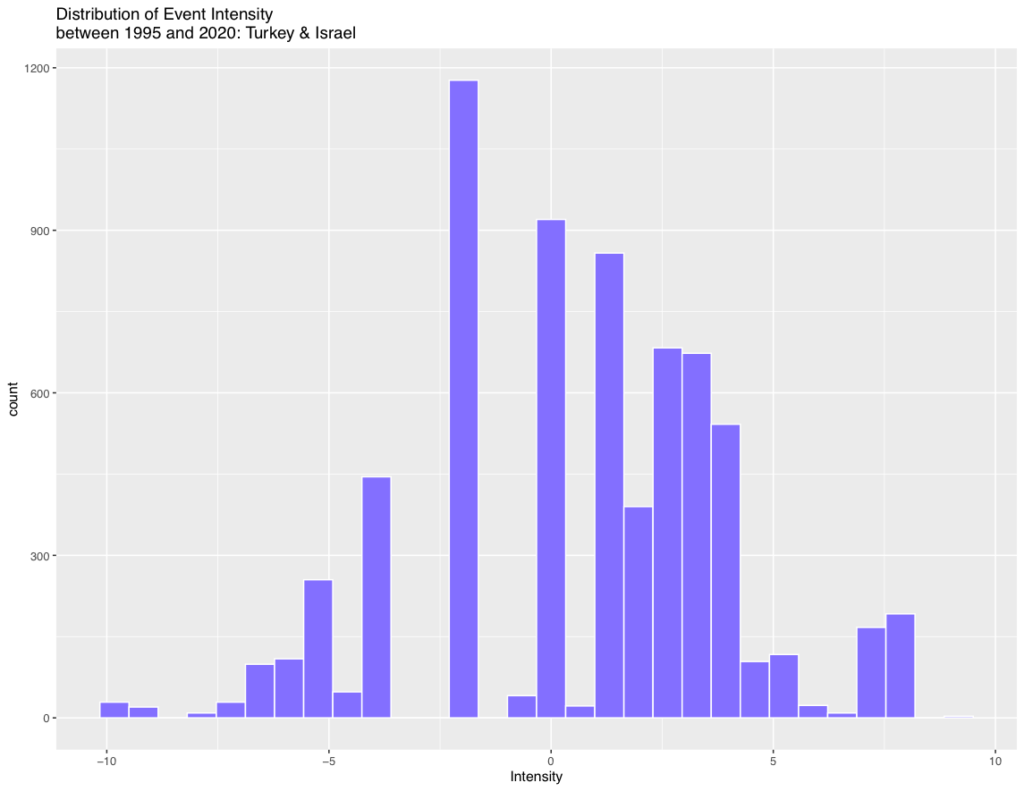
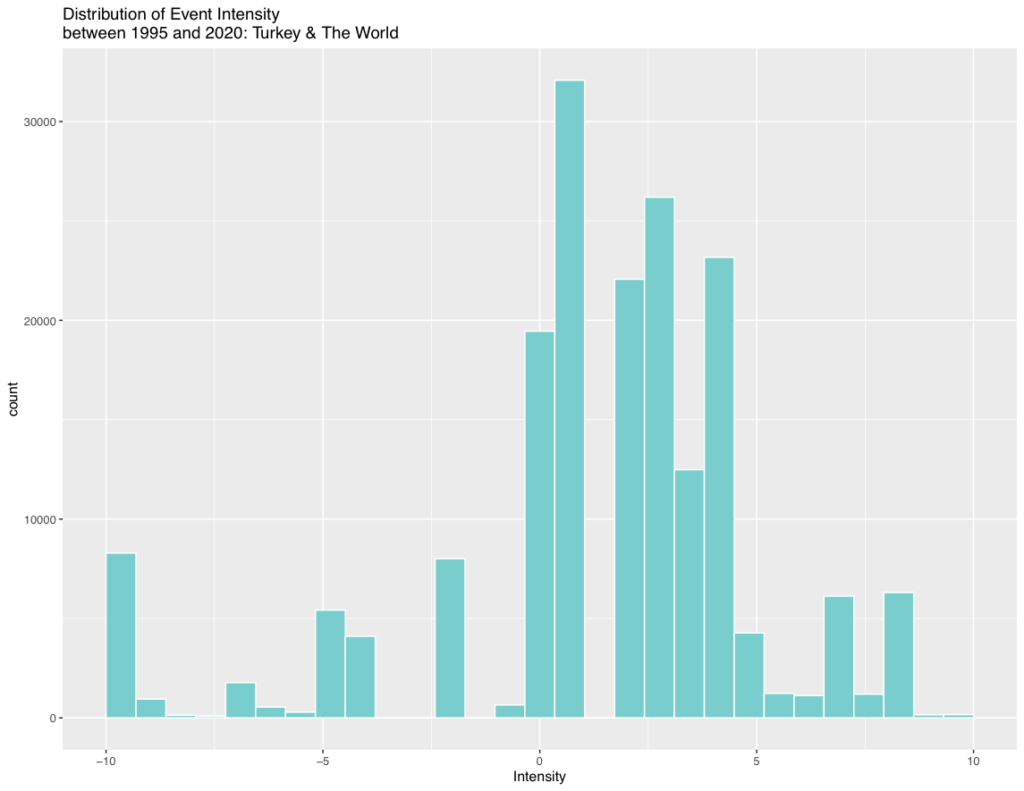
The disaggregation of interaction frequency by intensity over time provides more fine-grained data. Figure 3.4 demonstrates the annual distributions of interactions. The distribution at the bottom displays the values for 1995 and the one at the top for 2020. As always, while 0 marks neutral events, any interactions that are located to the right of 0 are classified as instances of cooperation, and to the left are instances of conflict. The magnitude of interaction intensity increases as it approaches the minimum and maximum values (10 and -10). The figure suggests a gradual shift from the right side of 0 to the left of it over the past two and a half decades. We also observe the extended left tails after 2002, which suggests cases of higher magnitude conflict. Figure 3.5 demonstrates the variation in relations during a given government.[3] The intensity and frequency of interactions with Israel are at their highest during the 59th, 60th, and 61st governments. We also observe an abrupt decline in interactions following the 61st Government, which corresponds to the discord in diplomatic relations between the two countries following the early 2010s.
States actively react to signals that they receive from their counterparts and adjust their foreign policy towards them. An index can be particularly useful for understanding the overall evolution of the signals in bilateral relations. Our most noteworthy contribution in this report is the index of bilateral relations between Turkey and Israel. We present the index in In Figure 3.6.
To draw our overall dyadic relations index, we begin with calculating a simple monthly intensity average of all interactions for a given month. The values of these averages are displayed with the black dots in Figure 3.6. A dot above zero suggests that the interactions for the month were cooperative, and a dot below suggests otherwise. Next, we move on to the trendline.
An upward-pointing trendline suggests an improvement in the bilateral relations and an increase in cooperation, whereas a downward-pointing trendline suggests growing discord, regardless of its color. We first focus on the short-term trends and calculate a six-month moving average. This line shows the average intensity scores considering the preceding six months and is displayed with the red line in Figure 3.6. This trendline describes the short-term cascades in which the two countries interact with each other.
Finally, we turn to the long-term and fit a non-parametric locally weighted smoothing line among all the monthly averages, which is displayed with the blue line in Figure 3.6. The grey band around the blue line shows the 95% confidence intervals. This line captures the trend in the long-term evolution of bilateral relations between Turkey and Israel. The line suggests an overall gradual decline in the relations. Simply, if we were to fit a straight line throughout the data within the timeframe under consideration, the slope of the line would be negative, suggesting a gradual regression in cooperative interactions between the two countries.
.
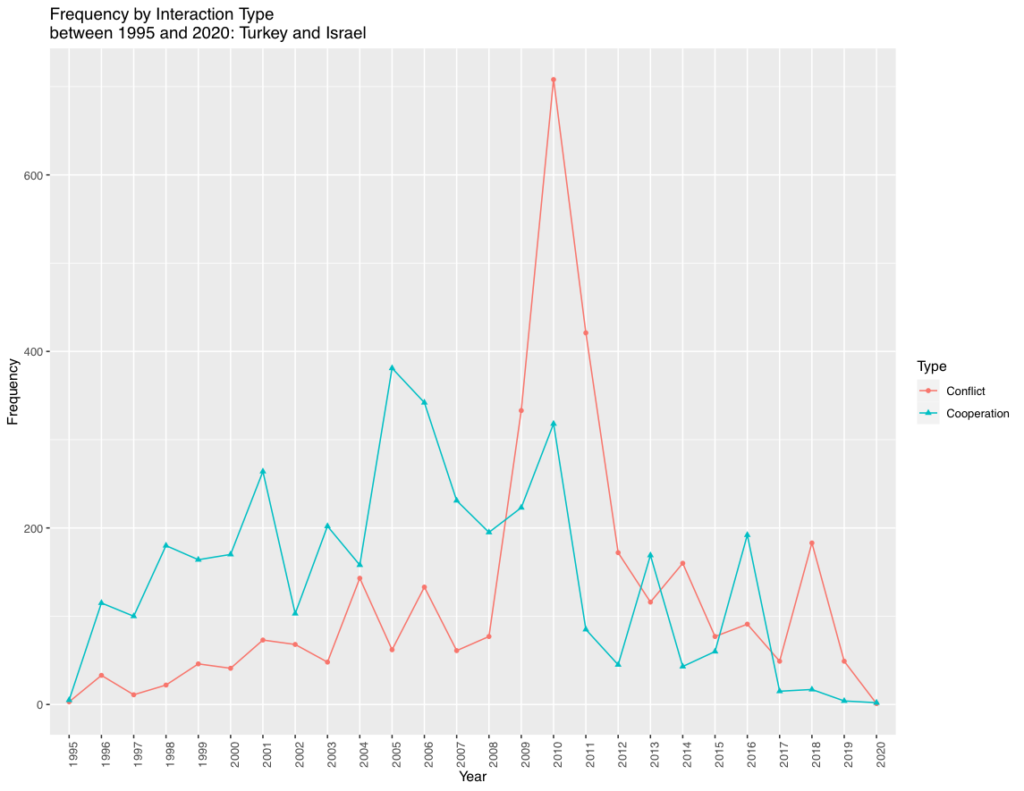

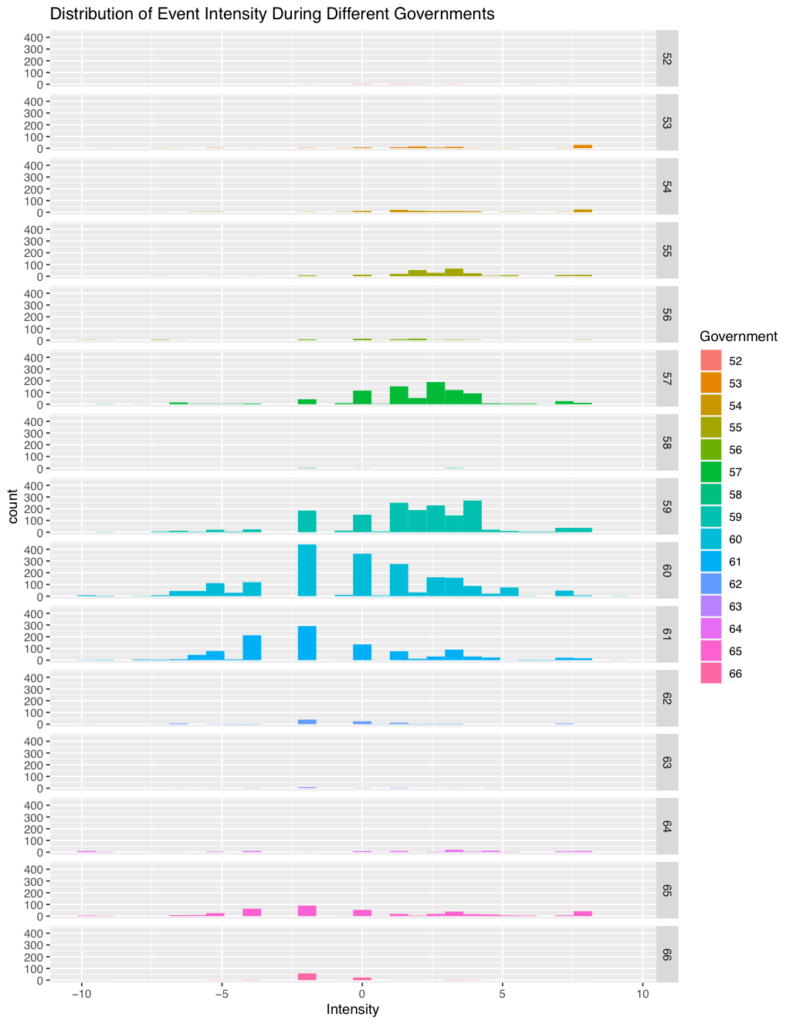
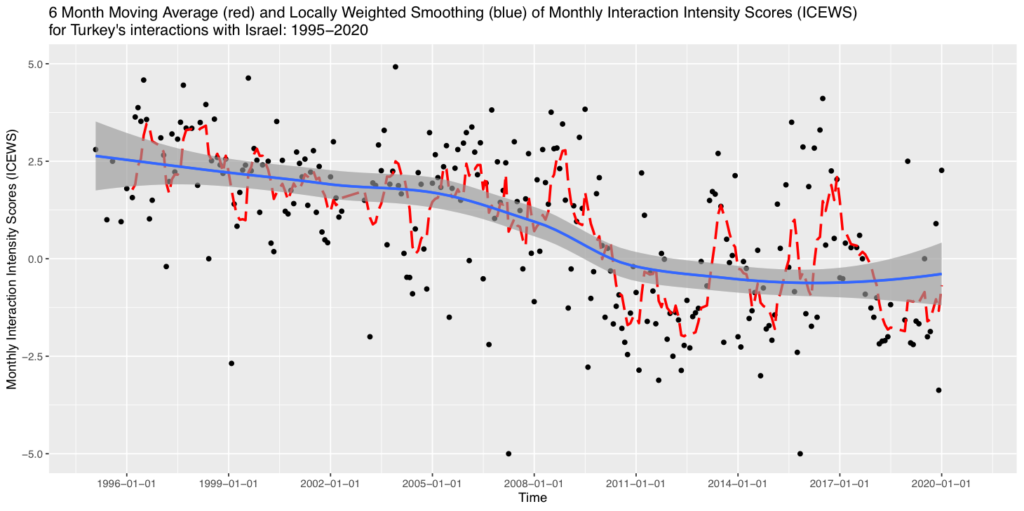
Defining Moments in Turkey – Israel Relations
What are the momentous events that defined the relations between Turkey and Israel? In this section, we focus on the milestones that defined the bilateral relations within the past two and a half decades between the two countries. We use the ICEWS intensity variable for filtering individual milestone interactions.
Military Training Cooperation Agreement, February 1996
Turkish Armed Forces and Israeli Defense Forces signed a Military Training Cooperation Agreement that aims to strengthen reciprocal relations in education and culture in the scope of military discipline spanning from mutual visits between headquarters and exchanges of military personnel. Deputy Chief of General Staff General Çevik Bir signed the agreement during his visit to Israel. The agreement allowed Israeli pilots to fly training missions in Turkish air space, and in return, Turkish officers received training on advanced technology warfare in Israel. [Source]
IAI Upgrades Turkey’s F-4, 1 March 1996
Israel Aircraft Industries (IAI) delivered the first of fifty-two upgraded McDonnell Douglas F-4 Phantom fighter bombers to the Turkish Air Force on 1 March. This delivery was the first upgraded F-4 to the Turkish Air Force provided by IAI. [Source]
Free Trade Accord, 14 March 1996
The Turkish-Israeli Free Trade Area Accord was signed and ratified by both parliaments in March 1996. FTA aimed to increase the annual mutual trade from $450 million to $2 billion in 3 years. Israel’s free trade ties with the United States open a gateway to Turkey’s possible trade engagement with North America through Canada and Mexico. [Source]
Israeli Air Force Training In Turkey, 16 April 1996
Israeli jets arrived in Turkey to begin training flights over the Turkish air space. The opportunity of Israel’s training in Turkey allowed them to practice more where Israeli air space was limited for the necessary air military training. In these practices, Israeli jets used four main jet bases of the Turkish Air Forces, including Eskisehir, Konya, and Akinci bases near Ankara. [Source]
Deepening Military Reciprocal Ties, 2 December 1996
Turkey and Israel deepened their military ties through another military agreement on joint exercises and increased military cooperation in 1997. The agreement was signed during General Ivri’s visit to Ankara. [Source]
Reliant Mermaid-99 Exercise, 5 January 1998
Turkey, Israel, and the USA naval forces multilaterally carried out the “Reliant Mermaid” exercise in the international waters of the Eastern Mediterranean and its airspace. [Source]
Turkey Warns Israel, 21 February 1999
After capturing the terrorist organization PKK’s Ocalan, three people were killed because they attacked Israel’s embassy in Berlin. In the continuation, Turkey’s Ambassador to Tel Aviv Ozener warned Israel not to contact the PKK after intensifying pro-PKK opinion in the Israeli media. [Source]
First Visit At The Level Of The Chief Of The General Staff, 24 February 1999
Chief of General Staff Karadayi visited Israel for the first time as the Head of the Army and met with Israeli Prime Minister Netanyahu and his counterpart, Israeli Chief of General Staff Lipkin-Shahak, to express intentions for deeper cooperation in the technical military issues. In support of this, PM Netanyahu said after the meeting, “Cooperation between us will bring stability and peace to the region.” [Source]
Turkey’s Acquisition Of Popeye II, 31 December 1999
Under the emergency supply condition, the Turkish Air Force acquired Popeye II air-to-ground missile (also named AGM-142 Have Nap) from Israel’s Rafael Advanced Defense System. [Source]
Manavgat Water Project To Israel, January 2000
Turkey and Israel signed a deal estimated at 1 billion USD that allowed Israel to purchase up to 50 million cubic meters of Turkish water. However, the Israeli Government opted out of the agreement, later on, to invest in domestic desalination facilities. [Source]
Modernization Of The M-60 Tank, 4 June 2000
Turkey’s Defense Industry Executive Committee agreed with Israel Military Industries (IMI System Ltd.) to modernize the M-60 tanks in the inventory of the Turkish Armed Forces. [Source]
Sharon – Ecevit Meeting, 7 August 2001
Israel’s Prime Minister Sharon visited his Turkish counterpart Prime Minister Ecevit to negotiate a strategic partnership with Turkey and discuss the Palestinian issue. [Source]
President Sezer Meets With Prime Minister Sharon, 8 August 2001
Turkey’s President Sezer hosted Israeli Prime Minister Ariel Sharon and the members of his delegation in Turkey. After the meeting, President Sezer pointed out the importance of bilateral relations for contributing to peace in the Middle East region at large. [Source]
Official Announcement Of M-60s Modernization, 8 March 2002
Prime Minister Bulent Ecevit announced that Turkey’s Undersecretariat for Defense Industries decided to sign a contract to modernize 170 M-60 A1 tanks with the Israeli IMI company. Ecevit stated that the total cost of the project was 668 million dollars. [Source]
Discord In Bilateral Ties, 16 June 2004
Hamas founder Sheikh Yassin was killed in an Israeli airstrike in June 2004. Following the operation, Prime Minister Erdogan stated that “Israel is committing state terrorism” and “Israel’s actions increase anti-Semitism worldwide.” In response to that speech, the Israeli Ministry of Foreign Affairs defined Prime Minister Erdogan’s statements as an encouragement to harm the Jewish community. [Source]
Detente In Bilateral Relations, 2 May 2005
After the strained bilateral relations in 2004 with the death of Sheikh Yassin, Prime Minister Erdogan met with his counterpart Sharon in Jerusalem in 2005. The Prime Minister said that “we consider that this visit will have important implications on the region’s countries. These meetings will also contribute to the cooperative co-existence of the Jewish state and Muslim countries and prove there are no obstacles to the friendly relations.” The parties also established a hotline between them. [Source]
Hamas Delegation Meets JDP Executives, 16 February 2006
A delegation headed by the Chairman of the Hamas Political Bureau Mashal visited Ankara and met with the Erdogan’s Justice and Development executives. In his reaction, Israeli Foreign Minister Livni criticized Ankara’s actions stating that “the visit undermines the international community’s efforts to isolate the terrorist organization.” [Source]
Turkey Sends Troops To Lebanon For UN Peacekeeping Forces, 6 September 2006
Justice and Development Party voted in the Grand National Assembly support of deploying Turkish troops to monitor the cease-fire between Israel and Hezbollah, despite objections from the opposition parties and President Sezer. [Source]
Peacemaker Role Of Turkey In Israel – Syria Relations, 13 July 2008
Israeli officials said that Turkish Prime Minister Tayyip Erdogan conveyed a peace-seeking message from Israeli Prime Minister Olmert to Syrian President al-Assad. [Source]
Guler Mets With Eliezer, 17 July 2008
Energy and Natural Resources Minister Guler met with the Israeli Minister of National Infrastructure Eliezer in Ankara. Eliezer said, “Israeli people and government are very grateful for Turkey’s mediation in Syria and Israel peace talks and its contribution to regional stability.” Both sides also discussed the potential energy and water project investments in the Eastern Mediterranean region. [Source]
Gaza War, 27 December 2008
Israeli Defense Forces initiated a military operation known as Operation Cast Lead (or Gaza War) in Gaza Strip, which began on 27 December 2008 and ended on 18 January 2009 with a unilateral ceasefire. After the commencement of the operation, Turkish Prime Minister Erdogan asserted that the operation was disrespectful to Turkey’s effort in the peace process and constituted harm to global peace. [Source]
“One Minute” Crisis In Davos, 30 January 2009
Prime Minister Erdogan stormed off the stage at the World Economic Forum in Davos after a tense debate on Gaza with Israel’s President Peres. Erdogan said to Peres, “I remember two former prime ministers in your country who said they felt very happy when they were able to enter Palestine on tanks.” [Source]
“Sofa Crisis” Turns Into Diplomatic Row, 13 January 2010
Israeli Deputy Foreign Minister Danny Ayalon called Turkey’s Tel Aviv Ambassador, Celikkol, to the Knesset. During their meeting, The Turkish Ambassador was seated in a chair lower than his Israeli counterpart, and although there was an Israeli flag on the table, there was no Turkish flag on the table. Turkey’s Prime Minister Erdogan and the Ministry of Foreign Affairs both criticized the treatment of Ambassador Celikkol by noting the lack of decorum. [Source]
Gaza Flotilla Raid, 1 June 2010
Israeli forces attacked a Turkish charity flotilla organized by an NGO titled IHH with close ties to JDP. The raid resulted in eight deaths. After the incident, Erdogan denounced the attack and said, “Today is a turning point; they once again showed their ability to perpetrate slaughters; we warn Israel not to test Turkey’s patience” and that Israel should “absolutely be punished by all means.” [Source]
Secret Meeting Unsuccessful, 1 July 2010
The meeting between Turkish Foreign Minister Davutoglu and Israeli Trade and Industry Minister Ben-Eliezer holds in Brussels, where Turkey appeals for an apology from Israel for the Flotilla raid to open a gateway for the reconciliation process in bilateral ties. Nevertheless, the sides failed to reach common ground on any issues. [Source]
Discord Between Countries Persists, 21 September 2010
Israeli President Peres said that his talks with Turkish President Gul were on the agenda during the Clinton Global Initiative meetings in New York but Turkey’s insistence on an apology regarding the Gaza Flotilla Raid precluded the meeting. [Source]
Suspension Of Defense Ties And Expels Of Ambassadors, 6 September 2011
Turkey suspended all defense ties with Israel over the Gaza Flotilla Raid. At the same time, Turkey’s Foreign Minister Davutoglu announced that Turkey had reduced its relations with Israel to the level of the second secretary. [Source]
Armenian Proposal, 24 April 2011
Israeli parliament discussed a proposal at the committee level to recognize “April 24th as the day when the massacre of the Armenian people began”. However, the committee did not make any decisions or issue any declaration. [Source]
Turkey Says Israel Not Welcome At NATO Summit, 23 April 2012
Turkey declined to participate of Israel to the NATO summit due to the refusal of Israel’s apology for the 2010 killing of Turkish activists in the Gaza Flotilla Raid. [Source]
Israel Apologizes To Turkey, 22 March 2013
President of the United States Obama persuaded Israeli officials to apologize to Turkey for the loss of nine lives in the incident of the Gaza Flotilla Raid. The Israeli officials announced that Netanyahu “apologized to the Turkish people for any errors that could have led to the loss of life.” The White House also indicated Erdogan accepted the apology, where Obama played a crucial for brokering the deal. [Source]
Erdogan Claimed Israel Orchestrated The Coup In Egypt, 23 August 2013
Prime Minister Erdogan stated that he had evidence that Israel was behind the military coup in Egypt, which concluded with overthrowing Egyptian President Morsi. [Source]
Israel Supplies Military Equipment To Turkey For First Time Since Gaza Flotilla Raid, 18 February 2013
Since relations between the two countries deteriorated after the Gaza Flotilla Raid, the Turkish Air Force supplied advanced electronic warfare systems from Israel in 2013. It is indicated that Boeing and American administration officials pressured the Israeli Government to end the freeze on advanced electronic warfare systems for the Turkish Air Force. [Source]
Netanyahu’s Support For Kurdish Independence, 29 June 2014
Israel’s Prime Minister Netanyahu became the first world leader that backed the establishment of Kurdish Independence in northern Iraq. Netanyahu claimed the creation of a Kurdish state in the Middle East would assist in the formation of an alliance of moderate powers. [Source]
Efforts For Diplomatic Cooperation, 17 August 2015
Adviser to Turkey’s Former Prime Minister Davutoglu, Aktay said that Turkey demands an official Israeli apology and financial compensation for the Mavi Marmara victims’ families and expects “a lifting of the Gaza siege in all its forms.” The Turkish Government implied with that statement that Turkish-Israeli detente was contingent on the Gaza ceasefire. [Source]
Israel & Turkey Agree To Normalize Ties, 26 June 2016
Israel agreed to pay out $20 million to the bereaved and injured in the Gaza Flotilla Raid in 2010. However, Israel didn’t accept to lift the Gaza blockade, one of Ankara’s three conditions for an agreement. According to Israeli sources, the Turkish side would instruct relevant Turkish agencies in the region to resolve the issue of missing Israelis in the Gaza Strip. [Source]
Israel Pays $20 Million To Turkey, 30 September 2016
The $20 million transactions due to the flotilla incident between Israel and Turkey were completed in September 2016. Turkey requested two other demands from Israel: a return of both countries’ ambassadors and an easing of a blockade on the Gaza Strip. [Source]
Israel Reacts To The Coup Attempt, 16 July 2016
After the coup attempt on 15 July 2016, the Israeli Government announced its support for Turkish President Erdogan. Ministry of Foreign Minister in Israel made an official statement “Israel respects the democratic process in Turkey and looks forward to continuing the reconciliation process between Turkey and Israel.” [Source]
Attack Attempt On Israeli Embassy, 21 September 2016
Two assailants attempted to attack the Israeli embassy in Ankara, where Turkish police neutralized the attackers. [Source]
Diplomatic Relations Traced Backed To Highest Level, 16 November 2016
The Israeli Ministry of Foreign Affairs appointed Na’eh as the Ankara Ambassador, and President Erdogan appointed Okem as Ambassador to Israel in response to this diplomatic engagement. Israel and Turkey mutually withdrew their ambassadors after the Mavi Marmara attack in 2010. The diplomatic relations between nations were carried out at the chargé d’affaires. [Source]
Turkey’s Chief Of Staff Met Israel Defense Forces Chief Of Staff, 19 January 2017
Turkish officials confirmed that Turkey’s Chief of Staff General Akar met Tuesday on the sidelines of a meeting of NATO military leaders with Israel Defense Forces Deputy Chief of Staff Major General Golan for the first high-level meeting between senior security officials from the two countries since before the Mavi Marmara incident. [Source]
Erdogan Sharpens His Rhetoric Against Israel, 10 December 2017
The US recognized Jerusalem as the capital of Israel on 6 December 2017. In his rebuke, Turkish President Erdogan described Israel as a child-killing “terrorist state.” President Erdogan stated that he vowed “all means to fight” against the US recognition of Jerusalem. [Source]
Turkey & Israel Expelled Diplomats Over Gaza Violence, 15 May 2018
After the opening of the U.S. Embassy in Jerusalem, the Israeli forces killed 60 Palestinians during protests on the Gaza border. Sides expelled each other’s, diplomatic envoys. [Source]
Israel Express Intend To Cooperate, 29 November 2018
Israel decided not to appoint a new ambassador to Turkey in response to Ankara’s decision not to return its own ambassador to Tel Aviv in line with the principle of reciprocity. However Israeli Foreign Ministry stated that “It is in Israel’s and Turkey’s interest to fully restore diplomatic representation.” [Source]
[iheu_ultimate_oxi id=”20″]
[1] Lautenschlager, Jennifer, Steve Shellman, and Michael Ward. 2015. “ICEWS Event Aggregations.” Harvard Dataverse V3.
[2] Notable events are captured by multiple news agencies leading to repetitions in the dataset.
[3] There are fifteen governments in our timeframe. The terms of these governments are as follows: the 52th Government of Turkey, October 30th, 1995, to March 6th, 1996; the 53th Government of Turkey, March 6th, 1996, to June 28th, 1996; the 54th Government of Turkey, June 28th, 1996, to June 30th, 1997; the 55th Government of Turkey, June 30th, 1997, to January 11th, 1999; the 56th Government of Turkey, January 11th, 1999, to May 28th, 1999; the 57th Government of Turkey, May 28th, 1999, to November 18th, 2002; the 58th Government of Turkey, November 19th, 2002, to March 12th, 2003; the 59th Government of Turkey, March 14th, 2003, to August 29th, 2007; the 60th Government of Turkey, August 29th, 2007, to July 6th, 2011; the 61th Government of Turkey, July 6th, 2011, to August 29th, 2014; the 62th Government of Turkey, August 29th, 2014, to August 28th, 2015; the 63th Government of Turkey, August 28th, 2015, to November 24th, 2015; the 64th Government of Turkey, November 24th, 2015, to May 24th, 2016; the 65th Government of Turkey, May 24th, 2016, to July 9th, 2018; the 66th Government of Turkey, July 10th, 2018 which is ongoing. We include the data for the 51st Government as part of the 52nd Government given its short term.
- This article has been published in cooperation with Friedrich Naumann Foundation.
Fotoğraf: Taylor Brandon

